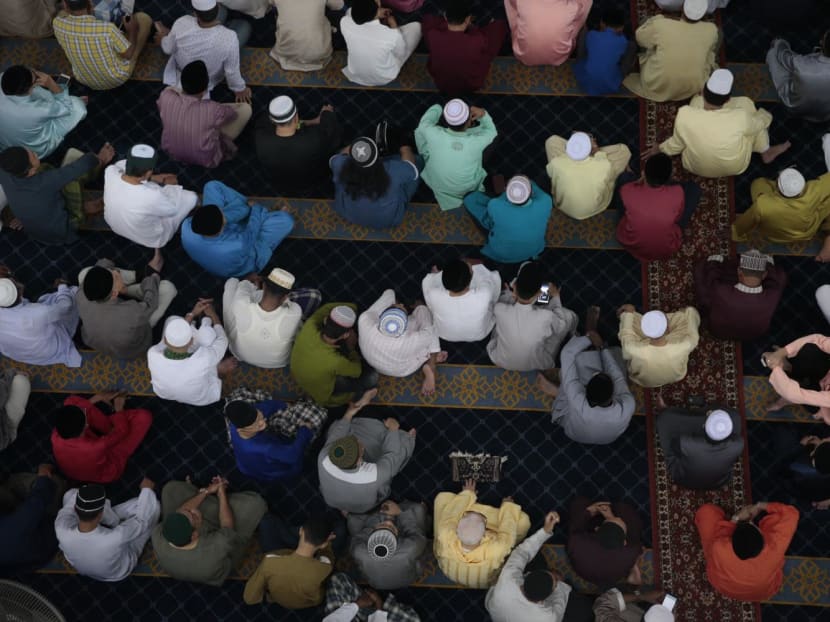Online comment that Islamic religious teachers receive warning for opposing LGBT is 'misleading': Muis, Asatizah board
SINGAPORE — A claim by a religious teacher that Islamic religious teachers are given warning letters for opposing the lesbian, gay, bisexual and transgender (LGBT) community is "clearly misleading", said the Islamic Religious Council of Singapore (Muis) and the Asatizah Recognition Board on Tuesday (June 6).

- A social media comment by a religious teacher claiming that Islamic religious teachers are given warning letters for opposing the LGBTQ+ community is "clearly misleading"
- The Islamic Religious Council of Singapore (Muis) and the Asatizah Recognition Board said this in a statement on June 6
- The same teacher had been issued with a warning letter in May 2022 for contravening the board's code of ethics
- The board said that it has met the religious teacher regarding his latest social media comment to clarify his allegations
SINGAPORE — A claim by a religious teacher that Islamic religious teachers are given warning letters for opposing the lesbian, gay, bisexual and transgender (LGBT) community is "clearly misleading", said the Islamic Religious Council of Singapore (Muis) and the Asatizah Recognition Board on Tuesday (June 6).
The Asatizah Recognition Board has never issued any warning letter to Islamic religious teachers for holding the view that Islam does not condone homosexuality or that same-sex marriage is a sin in Islam, the two bodies said in a joint press statement.
The comment by the religious teacher in a social media post on April 30, which has since been removed, had said that “asatizahs who opposed to the LGBT are given warning letters”.
The Asatizah Recognition Board approves the accreditation of Islamic religious teachers, also known as asatizahs, in Singapore. Its members comprise senior asatizahs who are appointed by Muis.
In their statement, the two bodies said that religious guidance on LGBTQ+ developments in Singapore issued by Muis last year explicitly states that marriage in Islam can only take place between a man and woman, and Islam forbids any other forms of sexual relationships and unions.
LGBTQ+ refers to the lesbian, gay, bisexual, transgender and queer and other sexual orientations community.
“The Muslim community will preserve its religious and family values especially when these are directly challenged and disputed," they added.
"All religious teachers are free to reiterate this religious position, and positions issued and verified by the Fatwa Committee, as they provide instruction and guidance to the community,” said the two organisations in their statement.
The Fatwa Committee is a body under Muis that issues religious edicts to help Muslims here navigate modern society according to Islamic principles.
In their statement, the two bodies said that the Asatizah Recognition Board had earlier been informed of various Facebook posts made by the same religious teacher from December 2021 to February 2022.
The organisations did not name the religious teacher or share details of these posts but said, in response to TODAY's queries on Tuesday, that these posts had been removed and there had been no online interactions between the teacher and LGBTQ+ groups.
But they added that in these posts, the teacher had used “inappropriate and inflammatory language that could incite hatred and disrespect towards members of the LGBTQ+ community in Singapore”.
The Asatizah Recognition Board had interviewed the teacher at the time and found that the Facebook posts contravened the code of ethics for the Asatizah Recognition Scheme, which provides accreditation to Islamic religious teachers.
All religious teachers must abide by the scheme's code of ethics, which includes provisions that an Islamic teacher must not do anything that is likely to cause public disorder or advocate any idea that is likely to directly or indirectly encourage extremism or violence.
The teacher was issued a warning letter on May 13 last year on these contraventions and told not to use controversial preaching methods that may lead to hatred and disrespect towards certain minority groups in Singapore.
Such warning letters are issued after much deliberation and taking into account the gravity of the contraventions, the statement added.
"The Asatizah Recognition Board advised him that he should address socio-religious issues, including LGBT issues, with wisdom, kindness, compassion and mercy."
The board has met the religious teacher regarding his latest social media comment to clarify his allegations and remind him of its earlier advice.
“The Asatizah Recognition Board will continue to guide and counsel such asatizah who have shown sincere remorse for their actions,” added the organisations in their statement.
In response to TODAY's queries on why he was given a reminder for his latest comment, Muis said that any contravention of the code of ethics is reviewed on a case-by-case basis.
"The Asatizah Recognition Board had and would take the necessary disciplinary actions against any asatizah who contravene the code of ethics which include mandatory counselling, suspension or cancellation," it added.











